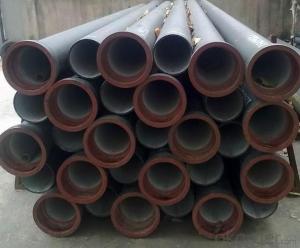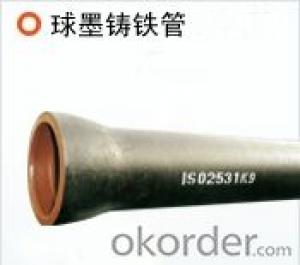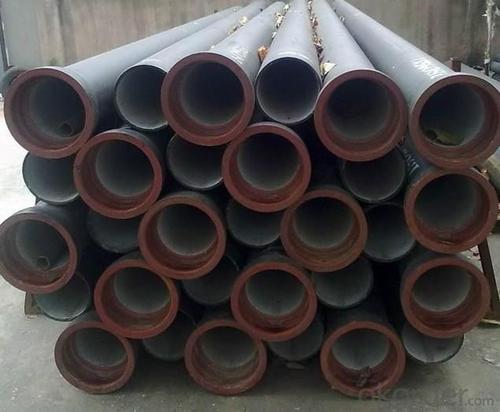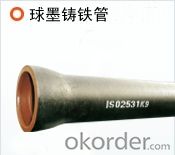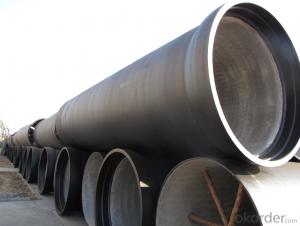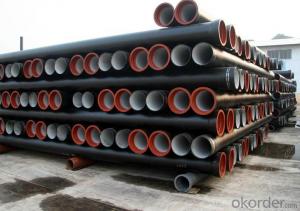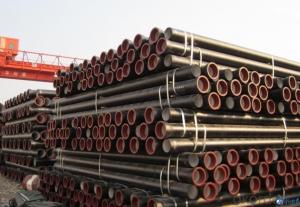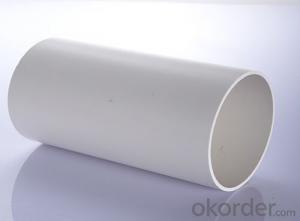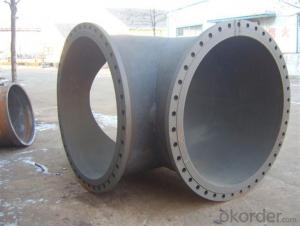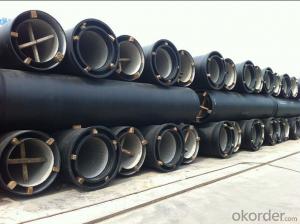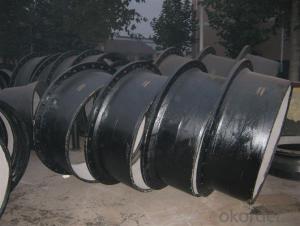Ductile Iron Pipe Cast Iron EN545 Class DN600
- Loading Port:
- China main port
- Payment Terms:
- TT OR LC
- Min Order Qty:
- 999 m
- Supply Capability:
- 9999 m/month
OKorder Service Pledge
OKorder Financial Service
You Might Also Like
1,Ductile Iron Pipe Description :
1) Pipes confirm to ISO2531,K9 class,T type joint,6m long,with inside cements lining conform to ISO4179, outside Zinc spraying(130g/m2) and bitumen coating(70μm) conform to ISO8179.
2) Pipe ends: Spigot and socket ends, with 100% SBR rubber gaskets accoding to ISO4633
3) we can do third party inspection according to customer's request.
4) Our products have been sold to many international market,such as Middle East and South East Asia and Africa.
2,Main Features of the Ductile Iron Pipe:
•High yield strength
•High tensile Strength
•High corrosion resistance
•Pressure Resistence
•Anti-corrosion
•Installation is convenient
•Satisfy the highest hygienic standards
1. Material: Ductile iron grade 500-7/ 450-10 in accordance with ISO1083
2. Standard: ISO 2531, EN545, EN598, ANSI, AWWA
3. Certificate: ISO9001, ISO14001, SGS, NSF, WRAS
4. Test: In accordance with ISO 2531 / EN 545 / EN598 and 100% water pressure test
5. Length: 6m or cut into 5.6m, 5.7m, 5.8m
6. Internal Lining: Cement, conform to ISO4179
3,Ductile Iron Pipe Images:
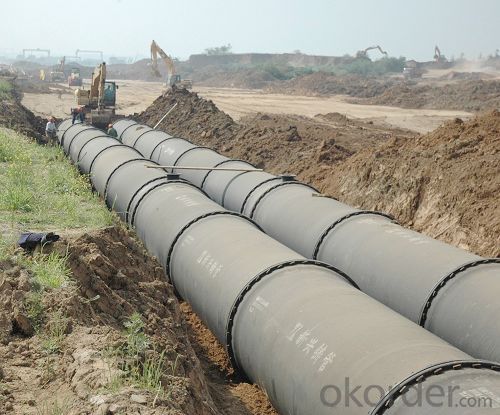
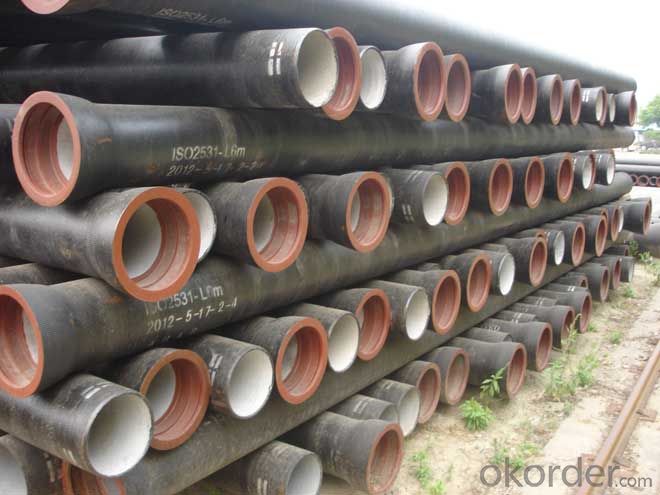
4. Ductile Iron Pipe Specification
Standard: API SPEC 5L 44th eidtion,ASTM A252-98(2007)
Grade: A53 Grades A/B, ASTM A106 Grades B/C,ASTM A179
AWWA, C200, ASTM A139, ASTM A120, API 5L Grade B
X42, X52, X56, X60, X65, X70, X80, X100
Weld Alternatives: LSAW
OD size range: 6.4~44.5mm
Wall thickness: 406.4~1422mm
Length: 3 - 12 m according to requirment
5.FAQ:
We have organized several common questions for our clients,may help you sincerely:
1.Q: Why would you choose ductile iron pipe rather than other pipe materials?
A:The reasons are obvious for that not only ductile iron pipe possesses the inherent strength and flexibility of ductile iron, combined with proven corrosion protection systems, but also the cost savings can be achieved from design to installation and commissioning.
2.Q:Why can you guarantee the inner of pipes can’t be corroded?
A: High alumina cement mortar lining and sulphate-resistant cement mortar lining. These two special linings are applicable to inner anti-corrosion for sewage pipes, improving resistance to erosion of the sewage components.
- Q: Can ductile iron pipes be used in geothermal systems?
- Ductile iron pipes are indeed suitable for geothermal systems. Their renowned strength and durability make them an excellent choice for various applications, including geothermal systems. These systems involve extracting heat from beneath the earth's surface, necessitating a dependable and robust piping system to transport the geothermal fluid. Ductile iron pipes can withstand high temperatures and pressures, making them perfect for carrying hot geothermal fluids. Moreover, they exhibit exceptional corrosion resistance, a crucial attribute for geothermal systems that often involve the circulation of corrosive fluids. In conclusion, ductile iron pipes provide a reliable option for geothermal systems due to their strength, durability, and ability to withstand high temperatures and corrosion.
- Q: What are the advantages of using ductile iron pipe over concrete pipe?
- Using ductile iron pipe instead of concrete pipe offers several advantages. To begin with, ductile iron pipe has a higher strength-to-weight ratio, making it capable of withstanding higher pressure and loads while being lighter. This makes it easier to handle and install, ultimately reducing labor costs and saving time. Additionally, ductile iron pipe has superior corrosion resistance, making it less susceptible to rust or degradation over time. This extends its lifespan and reduces the need for frequent repairs or replacements, making it a more cost-effective option in the long run. Moreover, ductile iron pipe is more flexible and resilient compared to concrete pipe. It can withstand ground movement, settling, and other environmental factors without cracking or breaking. This reduces maintenance and repair costs, ensuring its durability. Furthermore, ductile iron pipe has a smoother interior surface, resulting in improved flow characteristics and reduced friction. This allows for more efficient transportation of fluids and minimizes the risk of clogs or blockages, guaranteeing uninterrupted flow. Lastly, ductile iron pipe is highly versatile and suitable for a wide range of applications. It can be used for both above-ground and underground installations, making it ideal for various infrastructure projects such as water supply systems, wastewater treatment plants, and industrial applications. In conclusion, the advantages of using ductile iron pipe over concrete pipe include its higher strength-to-weight ratio, superior corrosion resistance, better flexibility and resilience, smoother interior surface, and versatility. These benefits make it a reliable and cost-effective choice for various infrastructure projects.
- Q: What's the difference between grey cast iron pipe and ductile iron pipe?
- Ductile iron is close to medium carbon steel and is much cheaper. Vermicular graphite iron is the best, but grey iron is worse and white iron is the worst. Therefore, the quality of ductile iron pipe with better quality and price is superior to other cast iron pipe fittings.
- Q: Is the spigot and socket connection of the ductile iron tube reversed?
- The three pass joint is formed by flattening a tube blank larger than three through diameter to approximately three through the diameter and opening a hole at the point of the branch pipe;
- Q: Can ductile iron pipes be installed outdoors?
- Graphite is exist in spherical form, usually graphite size is 6-7, casting spheroidization grade control requirements for 1-3 quality (spheroidization rate greater than 80%), so the mechanical properties of the material itself has been improved, has the essence of iron, steel performance. The annealed ductile iron pipe is composed of ferrite and pearlite. The mechanical properties of the ductile iron pipe are better.
- Q: Ductile iron pipe is how many years warranty
- In the ferrite and pearlite matrix on the distribution of a certain number of spheroidal graphite, according to the nominal diameter and the elongation of different microstructure of ferrite and pearlite in different proportions of small caliber pearlite percentage is generally not more than 20%, large diameter of the general control in about 25%.
- Q: What are the different methods for cutting ductile iron pipe?
- The cutting of ductile iron pipe can be done in various ways, depending on the project's specific needs and limitations. Some commonly used methods include: 1. Manual Cutting: To cut through the ductile iron pipe, one can employ a handheld saw or grinder equipped with an abrasive cutting wheel. While this method is simple and cost-effective, it can be laborious and time-consuming for larger pipe sizes. 2. Mechanical Cutting: Specialized machinery, such as bandsaws, pipe cutters, or hydraulic cutting machines, can be utilized to mechanically cut through the ductile iron pipe. These machines offer faster and more precise cuts, especially for larger pipe sizes. However, they tend to be more expensive and require skilled operators. 3. Torch Cutting: Also known as oxyfuel cutting, torch cutting involves heating the ductile iron pipe using a torch and then introducing a high-pressure oxygen stream to facilitate a chemical reaction that cuts through the metal. This method is effective for thick-walled ductile iron pipes but necessitates proper safety precautions due to the significant heat and sparks it generates. 4. Plasma Arc Cutting: The utilization of a high-velocity jet of ionized gas (plasma) to melt and cut through the ductile iron pipe characterizes plasma arc cutting. This method is ideal for precision and efficiency when cutting through thick-walled pipes. However, it can be more costly and may require specialized equipment and training. 5. Waterjet Cutting: Waterjet cutting involves using a high-pressure jet of water mixed with an abrasive material to cut through the ductile iron pipe. This method offers high precision and does not generate heat or sparks, making it suitable for sensitive environments. However, it tends to be slower and more expensive compared to other cutting methods. When selecting the appropriate method for cutting ductile iron pipe, factors such as pipe size, project requirements, budget, and safety must be taken into consideration. Consulting professionals or experts in the field can assist in determining the most suitable method for a specific project.
- Q: How does ductile iron pipe compare to steel pipe in terms of durability?
- Ductile iron pipe is generally considered to be more durable than steel pipe. It has superior strength and durability due to its unique microstructure, which allows it to withstand higher levels of pressure, impacts, and loads. Ductile iron pipe also has better corrosion resistance properties, making it less prone to rust and deterioration compared to steel pipe. Additionally, ductile iron pipe has a longer lifespan and requires less maintenance, making it a more reliable and durable choice for various applications.
- Q: What is the difference between a cast iron pipe and a ductile iron pipe?
- Nodular cast iron has high strength and strong plasticity. The tensile strength of ductile iron is twice that of gray iron, and the yield strength even exceeds that of cast steel.
- Q: Are ductile iron pipes suitable for water distribution networks?
- Yes, ductile iron pipes are highly suitable for water distribution networks. They possess excellent strength, durability, and corrosion resistance, making them ideal for carrying and delivering water over long distances. Additionally, their flexibility allows for easy installation and adaptability to various terrains, ensuring reliable and efficient water distribution.
Send your message to us
Ductile Iron Pipe Cast Iron EN545 Class DN600
- Loading Port:
- China main port
- Payment Terms:
- TT OR LC
- Min Order Qty:
- 999 m
- Supply Capability:
- 9999 m/month
OKorder Service Pledge
OKorder Financial Service
Similar products
Hot products
Hot Searches
Related keywords
